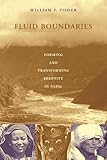Fluid Boundaries : Forming and Transforming Identity in Nepal / William Fisher.
Material type: TextPublisher: New York, NY : Columbia University Press, [2001]Copyright date: ©2001Description: 1 online resource (256 p.)Content type:
TextPublisher: New York, NY : Columbia University Press, [2001]Copyright date: ©2001Description: 1 online resource (256 p.)Content type: - 9780231110877
- 9780231504805
- 305.891/495
- online - DeGruyter
- Issued also in print.
| Item type | Current library | Call number | URL | Status | Notes | Barcode | |
|---|---|---|---|---|---|---|---|
 eBook
eBook
|
Biblioteca "Angelicum" Pont. Univ. S.Tommaso d'Aquino Nuvola online | online - DeGruyter (Browse shelf(Opens below)) | Online access | Not for loan (Accesso limitato) | Accesso per gli utenti autorizzati / Access for authorized users | (dgr)9780231504805 |
Browsing Biblioteca "Angelicum" Pont. Univ. S.Tommaso d'Aquino shelves, Shelving location: Nuvola online Close shelf browser (Hides shelf browser)

|

|

|

|

|

|

|
||
| online - DeGruyter The Millennial Sovereign : Sacred Kingship and Sainthood in Islam / | online - DeGruyter Russia and the Idea of the West : Gorbachev, Intellectuals, and the End of the Cold War / | online - DeGruyter Modernity and Culture : From the Mediterranean to the Indian Ocean / | online - DeGruyter Fluid Boundaries : Forming and Transforming Identity in Nepal / | online - DeGruyter Meds, Money, and Manners : The Case Management of Severe Mental Illness / | online - DeGruyter Quotations for All Occasions / | online - DeGruyter Substance Abuse Intervention, Prevention, Rehabilitation, and Systems Change : Helping Individuals, Families, and Groups to Empower Themselves / |
Frontmatter -- Contents -- Maps and Tables -- Preface -- Acknowledgments -- 1 Introduction: Thakali Again for the Very First Time -- 2 Drawing Lines: On Constructing and Contesting Boundaries -- 3 Forging Histories -- 4 Separation and Integration: Community and Contestation -- 5 Ritual Landscapes -- 6 Codifying Culture -- 7 Constructing Thakali -- 8 Beyond Sanskritization -- 9 Old Artificers in a New Smithy -- Notes -- Glossary -- Works Cited -- Index
restricted access online access with authorization star
http://purl.org/coar/access_right/c_16ec
More than an ethnography, this book clarifies one of the most important current debates in anthropology: How should anthropologists regard culture, history, and the power process?Since the 1980s, the Thakali of Nepal have searched for an identity and a clarification of their "true" culture and history in the wake of their rise to political power and achievement of economic success. Although united in this search, the Thakali are divided as to the answers that have been proposed: the "Hinduization" of religious practices, the promotion of Tibetan Buddhism, the revival of practices associated with the Thakali shamans, and secularization. Ironically, the attempts by the Thakali to define their identity reveal that to return to tradition they must first re-create it-but this process of re-creation establishes it in a way in which it has never existed. To return to "tradition"-to become Thakali again-is, in a way, to become Thakali for the very first time.
Issued also in print.
Mode of access: Internet via World Wide Web.
In English.
Description based on online resource; title from PDF title page (publisher's Web site, viewed 02. Mrz 2022)


